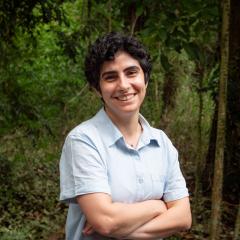An innovative ARC Training Centre dedicated to training the next generation of plant and animal breeders has begun its work.
The ARC Training Centre in Predictive Breeding for Agricultural Futures is supported by the Australian Research Council and 36 partner organisations representing a diverse range of important agricultural species.

The Centre is led by The University of Queensland (UQ) and spans four other Australian universities, including The University of Western Australia, La Trobe University, The University of New England and the University of Wollongong.
Centre Director, UQ’s Professor Lee Hickey said the Centre is the first of its kind, designed to fill gaps in training identified by Australian plant and animal breeding organisations.
“A survey outlined opportunities to further improve training and a critical shortage of highly skilled breeders,” Professor Hickey said.
“A key gap identified by 97 per cent of respondents was that PhD graduates have a poor working knowledge of commercial breeding.
“With this in mind, the Centre is focused on ensuring that future graduates have a more rounded skillset and exposure, with the research and training completed in collaboration with industry.”
39 PhD and postdoctoral research fellow projects co-designed with industry partners offer unique opportunities, including industry placements, access to a series of bespoke courses, and annual face-to-face training workshops on plant and animal breeding.
Matt McDonagh, CEO of the Australian Wagyu Association (AWA), said the ARC Training Centre was pivotal to further integrating quantitative genetics skills into the animal breeding sector.
“The AWA will leverage the Training Centre program to support critical research and innovation in delivering new industry outcomes from Wagyu Sector data to benefit Australia’s highest value agricultural exports,” Mr McDonagh said.
CEO Tress Walmsley said InterGrain was celebrating the launch.
“As an industry partner, we look forward to supporting the next generation of highly skilled plant breeders through the efforts of this Centre. This cohort will be an integral component towards breeding varieties in an unpredictable climate,” Ms Walmsley said.
The Centre will benefit capacity building for more than 20 agriculturally important species or commodities produced in Australia, such as apples, barley, beef cattle, canola, chickpea, cotton, dairy cattle, aquaculture species, grapevine, hops, lucerne, macadamia, mungbean, oats, onions, sheep, soybean, strawberry, sugarcane, trees and wheat.
Updates will be provided on the ARC Training Centre in Predictive Breeding website and social media channels.
A formal event to celebrate the launch will be hosted at The University of Queensland in November 2024.
Contact: Professor Lee Hickey, Director ARC Training Centre in Predictive Breeding, T: +61 7 336 54805, E: l.hickey@uq.edu.au or Dr Carly Hamilton, Centre Manager ARC Training Centre in Predictive Breeding, T: +61 7 3363 3742, E: predictivebreeding@uq.edu.au W predictive-breeding.org
The Queensland Alliance for Agriculture and Food Innovation is a research institute at The University of Queensland supported by the Queensland Government via the Queensland Department of Agriculture and Fisheries.



